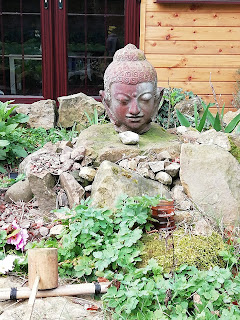The Sage King and The Rainmaker
The Sage King and The Rainmaker
I consulted the I Ching yesterday morning - there's nothing unusual in that, I have consulted the I Ching on and off when needed or just when something inclined me to for the past 45 years or more; and more or less since the beginning of the current crisis, I have done so on an almost daily basis. Now, I must admit, I first discovered the I Ching in the Seventies through popular culture, however, I soon discovered that Jung had written an introduction to the first translation to be widely produced in Europe and that he continued to consult and study it throughout his life.
"having performed his duties and isolated himself from the world...."
That got me to thinking about The Rainmaker.
This is a story that Jung was fond of telling, and he even recommended that no seminar on Active Imagination should ever be given without this story being told first. The story was related to Jung as fact by Richard Wilhelm, the man who made the translation of the I Ching.
:max_bytes(150000):strip_icc()/laozilaotzu-56afcaa25f9b58b7d01d19c5.jpg)

"For from His fullness we have all received grace upon grace" John 1:16
This is a story that Jung was fond of telling, and he even recommended that no seminar on Active Imagination should ever be given without this story being told first. The story was related to Jung as fact by Richard Wilhelm, the man who made the translation of the I Ching.
:max_bytes(150000):strip_icc()/laozilaotzu-56afcaa25f9b58b7d01d19c5.jpg)
The Rainmaker
There was
a great drought where Wilhelm lived; for months there had not been a drop of
rain and the situation became catastrophic. The Catholics made processions, the
Protestants made prayers, and the Chinese burned joss sticks and shot off guns
to frighten away the demons of the drought, but with no result.
Finally the
Chinese said: We will fetch the Rainmaker. And from another province, a dried
up old man appeared. The only thing he asked for was a quiet little house somewhere,
and there he locked himself in for three days.
On the fourth day clouds
gathered and there was a great snowstorm at the time of the year when no snow
was expected, an unusual amount, and the town was so full of rumours about the
wonderful rain maker that Wilhelm went to ask the man how he did it.
In true
European fashion he said:
“They call you the Rainmaker, will you tell me how
you made the snow?” And the little Chinese man said:
“I did not make the snow, I
am not responsible.”
“But what have you done these three days?”
"Oh, I can
explain that. I come from another country where things are in order. Here they
are out of order, they are not as they should be by the ordnance of heaven.
Therefore, the whole country is not in Tao, and I am also not in the natural
order of things because I am in a discorded country. So I had to wait three
days until I was back in Tao, and then naturally the rain came.”
Taken
from Vision Seminars, pp. 333-334
According to Murray Stein, the first thing this story tells us is this: there is a
problem in life where external solutions are not effective. Here we find a
country locked in drought, a dire condition. Without water, life itself is
threatened, and new life is impossible.
You can’t solve this problem with conventional means because
they do not connect any longer to the sources of life. Rituals have become
nothing more than occasions for noise making, traditional prayers no more than
exercises for the vocal cords. People try everything but the necessary:
jogging, pill-popping, going to the movies, shopping – all of these activities
are nothing but distractions and have no lasting effect. None offers a solution
to this problem… We also know that advice, strategies, exercises, labeling and
what not else are useless because they do not contact the source, the living
waters.
"It may look like we are working in isolation and we may only be a limited number of individuals..."
The Rainmaker asks for a shelter at the edge of town, and he
then enters the small hut on the margin, and into himself. This is not
defensive withdrawal. It is a strategy for dealing with the illness in the
land. The healer is not trying to save himself by withdrawing. He is preparing
the way for curing illness by taking a course of action that may look puzzling.
It is certainly indirect. The people must be wondering if he knows what he’s
doing, because nothing happens for three days. We can imagine their frustration
and impatience, they’ve paid good money to this bloke, and nothing’s happening!
Three days can seem like a long time (remember the three days of the first Easter - Jesus's band of loyal followers are either hiding or on the run…), and
things may get worse in that time.
But we should have faith. We know that the
Rainmaker ‘gets it’ and is working on the problem, but in an inward way. This
is different from the extraverted attempts taken before by the people trying to
solve the problem. He is not out there teaching and instructing, preaching and
admonishing. He is working in another dimension. Why does Jung want us to
remember this story? It must be because it corresponds to a plan of action that
deeply belongs to our culture… It shows a pattern that we can follow in taking
on similar problems as they come to us in our world today.
One thing we can take form this story is: the individual is
not isolated from the community even though their method is introverted. We
often think that working on ourselves only benefits us, but the deeply
introverted work that is done in self-growth (Individuation) is not only for
our benefit as individuals. The solutions we find by creating connections to
the unconscious will benefit everyone around us.
Health is as contagious as illness.
Health is as contagious as
illness. We see this in fairy tales and symbolic stories. Marie Louise von
Franz draws attention to the last image
in the Zen parable of the “Ox Herding Pictures” where there is “wise old man
with a kind of insipid, friendly smile on his face walks with a begging bowl
accompanied by his chela (student),” - quite possibly the Rainmaker of our story - and the text tells us that “wherever he
goes the cherry trees burst into bloom”. Growth and fruitfulness accompany him
as he makes his way back into and through the community. The process (of
individuation) was not only for him individually, but also for the whole
community. -

One final lesson to take away form The Rainmaker.
The
Rainmaker himself is utterly without inflation – he is small and humble and after
his success in bringing rain to the dry land he takes no credit. In fact, it is
a misnomer to call this man a Rain-maker. The rain falls Deo concedente (which
for all you non-Latin speakers out there, means “God grants it”). This does not
mean that the Rainmaker had nothing to do with it, only that credit for the
results must not be taken by the ego. It is not by our methods and techniques,
or by our personalities, or by our good training and deep immersion in the
study or archetypes, or by the years of therapy we might have done, that the healing
of our communities comes about. All of that is important, but we cannot take
credit for positive results. The Rainmaker credits the Tao. As Jungians we
would credit the Self, by which we mean the mysterious nucleus of the psyche.
Gratitude must therefore be our constant companion, for healing comes by grace.
The Invitation
And so, this current situation can be seen as an invitation, and a gracious gift from the Self to those of us fortunate enough not to be suffering directly. We all have the opportunity in these times of Social Distancing and Isolation to become the Rainmakers - to do the work which, Deo concedente, will bring the world back into balance.
A Blessing on those who have been, and those who are yet to be, taken.
gate gate pāragate pārasaṃgate bodhi svāhā!
Gone, gone, gone beyond, gone beyond all form, wake up, be happy!
References
Douglas, C. (editor) Visions: Notes of the Seminar Given in 1930-1934 by C. G. Jung (Jung Seminars)
ISAP Commencement Address, December 2015, By Murray Stein. http://www.murraystein.com/Stories_to_Tell_and_to_Live_With.shtml
von Franz, Marie-Louise. Alchemical Active Imagination (C.
G. Jung Foundation Books) (p. 108). Shambhala. Kindle Edition.



Comments
Post a Comment